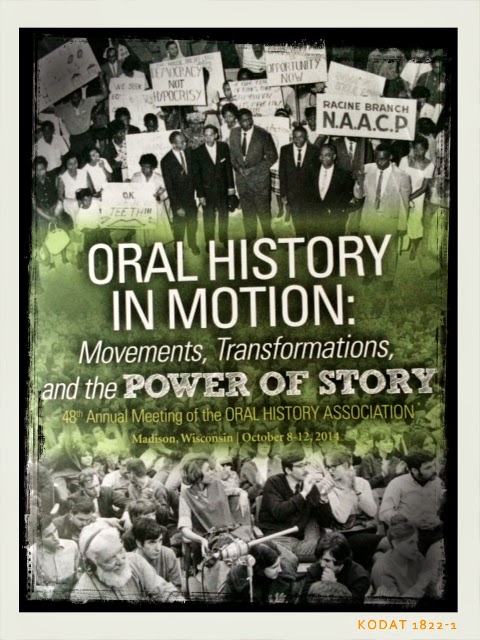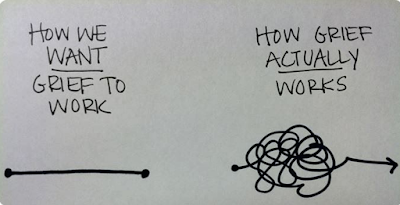Public Historians are Something More than Nice
I went to numerous conferences this year. It was a nice perk of being a fellow at the Collaborative for Southern Appalachian Studies. Sharing my work on participatory cultural memory, I was on panels with literary theorists, social workers, psychologists, planners, musicologists and geographers.
Traveling outside my academic "home" of public history was a learning experience for me. I love my sub-discipline and have long been a booster for public history as a rich community of practitioners and scholars. When one of my students attended her first National Council on Public History annual meeting a few weeks ago in Indianapolis and declared of attendees, "I can honestly say these were the most supportive people I have ever met in my life," my reaction was, "Yes - of course. That is who we are."
With the exception of the American Association of Geographers' meeting, I gotta say that I found academic conferences to be largely unfriendly and uncomfortable affairs. No one seemed to be having much of a good time and people seemed to be deeply invested in the cult of busy. (The geographers were great -- curious, interdisciplinary, generous. Theirs is a big tent and they throw their arms open wide and invite everyone in.)
These experiences made me think about something important. Public historians are nice. When you meet us, we will probably listen to you. We will make eye contact. We will slow down.
We tend to seek and find connection. We amplify what is good and important and we express sympathy over what is a struggle or a failure. We don't just ask questions; we ask good questions. We don't ask where you attended school or where you work before we engage in conversation. We assume we have something to learn through our interaction. There are a few public historians who don't, but I contend they fell into public history rather than chose it.
One of my students made an observation after having read Denise Meringolo's book, Museums, Monuments and National Parks. "One of the reasons public historians are so interconnected in what they do and how they do it is that they weren't always accepted or respected and they still aren't 100% sure what makes someone a public historian. They bond together as a community but don't worry too much about the definitions. This is built into their professional identity."
Interconnection. Those of us who have chosen to identify as public historians and contribute to our movement and our field share something important in common. We value relationships as central and fundamental to our work. We recognize that cultivating, honoring and respecting relationships are the bread and butter of public history. We might actually also be terrific people (and I think terrific people do get drawn to this work,) but we are not just terrific people. We are people who practice relationship-building all the time. We are extremely good at it and extremely reflective about it.
When you meet us, and you find us supportive and engaging and open, we are performing our competency and expertise in our field. We are also often generous, accommodating, cooperative, and flexible.
I write this because I see over and over again that these skills are undervalued and devalued. People tell me all the time that they have met my public history colleagues; they tell me how nice and warm they are. I do not think it is a coincidence that these public history colleagues are often women. What are actually skills are considered to be (oftentimes gendered) personality traits, ways of being that predispose us to public history practice.
It is understood that we are drawn to engage with diverse publics because of our temperaments, because we are friendly and open and nice. Actually, we learn these skills on the job and we practice them daily. We cannot be effective public historians without tact, diplomacy, generosity, patience, humility and the ability to listen more than we talk. (For the record, I find much of this to be true of oral historians as well.) Yes, we may do interpretation or heritage studies or memory studies or material culture or NPS histories or digital history. But how we do it -- that is what distinguishes us as public historians.
Next time you meet a public historian and you want to tell them how nice they are, instead, consider telling them that they are damned good at what they do.
Traveling outside my academic "home" of public history was a learning experience for me. I love my sub-discipline and have long been a booster for public history as a rich community of practitioners and scholars. When one of my students attended her first National Council on Public History annual meeting a few weeks ago in Indianapolis and declared of attendees, "I can honestly say these were the most supportive people I have ever met in my life," my reaction was, "Yes - of course. That is who we are."
With the exception of the American Association of Geographers' meeting, I gotta say that I found academic conferences to be largely unfriendly and uncomfortable affairs. No one seemed to be having much of a good time and people seemed to be deeply invested in the cult of busy. (The geographers were great -- curious, interdisciplinary, generous. Theirs is a big tent and they throw their arms open wide and invite everyone in.)
These experiences made me think about something important. Public historians are nice. When you meet us, we will probably listen to you. We will make eye contact. We will slow down.
We tend to seek and find connection. We amplify what is good and important and we express sympathy over what is a struggle or a failure. We don't just ask questions; we ask good questions. We don't ask where you attended school or where you work before we engage in conversation. We assume we have something to learn through our interaction. There are a few public historians who don't, but I contend they fell into public history rather than chose it.
One of my students made an observation after having read Denise Meringolo's book, Museums, Monuments and National Parks. "One of the reasons public historians are so interconnected in what they do and how they do it is that they weren't always accepted or respected and they still aren't 100% sure what makes someone a public historian. They bond together as a community but don't worry too much about the definitions. This is built into their professional identity."
Interconnection. Those of us who have chosen to identify as public historians and contribute to our movement and our field share something important in common. We value relationships as central and fundamental to our work. We recognize that cultivating, honoring and respecting relationships are the bread and butter of public history. We might actually also be terrific people (and I think terrific people do get drawn to this work,) but we are not just terrific people. We are people who practice relationship-building all the time. We are extremely good at it and extremely reflective about it.
When you meet us, and you find us supportive and engaging and open, we are performing our competency and expertise in our field. We are also often generous, accommodating, cooperative, and flexible.
I write this because I see over and over again that these skills are undervalued and devalued. People tell me all the time that they have met my public history colleagues; they tell me how nice and warm they are. I do not think it is a coincidence that these public history colleagues are often women. What are actually skills are considered to be (oftentimes gendered) personality traits, ways of being that predispose us to public history practice.
It is understood that we are drawn to engage with diverse publics because of our temperaments, because we are friendly and open and nice. Actually, we learn these skills on the job and we practice them daily. We cannot be effective public historians without tact, diplomacy, generosity, patience, humility and the ability to listen more than we talk. (For the record, I find much of this to be true of oral historians as well.) Yes, we may do interpretation or heritage studies or memory studies or material culture or NPS histories or digital history. But how we do it -- that is what distinguishes us as public historians.
Next time you meet a public historian and you want to tell them how nice they are, instead, consider telling them that they are damned good at what they do.









Thank you so much for sharing this post.
ReplyDeleteGlad it resonated!
ReplyDelete